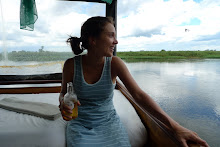bus station encounters
I had forgotten what out-of-the-ordinary people I met when I lived in Maun. Waiting for the bus from Johannesburg to Gaborone (it saved me 340 bucks in airfare but after twenty hours of flying cost me a portion of my sanity), I managed to bump into a friend of a good friend from my days in the Maun CI (Conservation International) office, whom I remembered was a Swiss pilot who had been building up his flight hours flying small bush planes out in the Delta. Turns out he was now headed to Botswana to visit friends, on break from his new job flying for the UN in Sudan. He had previously been flying big wig corporate oil guys around Algeria, and now was stationed in Darfur, a pilot for the food aid and relief planes in the region. How’s that I asked, trying not to sound too ignorant but fascinated by what such a job could be like. Oh it’s fine, the pay is good, I get long breaks, decent benefits from the Swiss air company, he responded. I must have just stared at him for a minute—that’s it?? That’s all he’s got to say about flying food aid planes around Darfur in the middle of a civil war and genocide?? I think he added something about it feeling pretty safe in the area where he lived except for sometimes gunshot sounds at night and that there was a volleyball court for the expat relief workers that he sometimes played on, but that just only furthered my incredulity. Under what circumstances does such a career and lifestyle become so normalized? How does that happen? Was this what would happen to anyone who spent enough time in such places? I would have written him off as just showing off his tough pilot bravado except that somewhere in the conversation—after I think I had said something silly like at least in Darfur he didn’t have to worry about hitting dangerous animals during landings like in the Okavango--he dropped a line about man being the most vicious animal on Earth anyways, given the things we do to each other. Hmm. So it’s not all volleyball nets and business as usual flying, whatever the context. Perhaps it had all got to him in a way, and maybe resignation and the treatment of the abnormal as part of regular everyday life was the only way to cope, when what should be the unimaginable in fact happens every day. Either way, I wondered what, after flying planes around the swamps of the Okavango, the sandy Algerian desert and war-torn Sudanese villages, he would do next.


0 Comments:
Post a Comment
<< Home